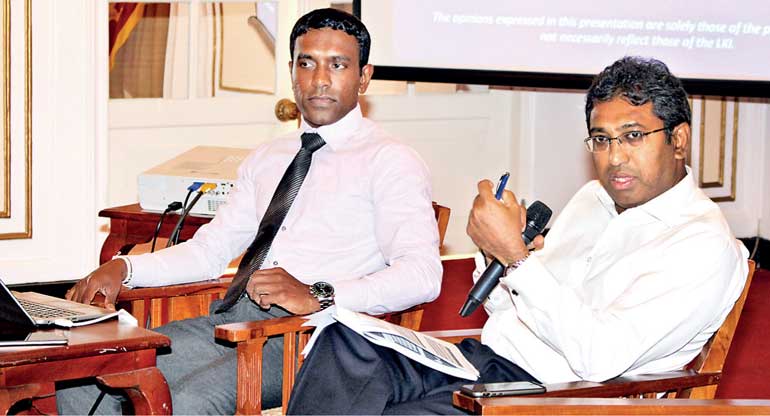Wednesday Feb 18, 2026
Wednesday Feb 18, 2026
Thursday, 23 March 2017 00:00 - - {{hitsCtrl.values.hits}}
 LKI Research Director Ravindra Deyshappriya and Deputy Minister of Foreign Affairs Dr. Harsha de Silva
LKI Research Director Ravindra Deyshappriya and Deputy Minister of Foreign Affairs Dr. Harsha de Silva
Ravindra Deyshappriya, Research Director of the Global Economy programme at the Lakshman Kadirgamar Institute of International Relations and Strategic Studies (LKI), recently made an invited presentation on ‘Sri Lanka-China Economic Relations in Comparative Context’ at the Ministry of Foreign Affairs. The presentation was chaired by Deputy Minister of Foreign Affairs Dr. Harsha de Silva, and attended by around 40 officers of the Foreign Ministry.
Deyshappriya’s presentation was the first contribution to a series of seminars initiated by the Foreign Ministry, which intends to offer new ideas and research on topics relevant to the Ministry’s work. Deyshappriya presented his recent working paper on Sri Lanka-China Economic Relations and highlighted policy priorities to strengthen trade, investment and tourism relations between the two countries.
His presentation noted that flooding imports from China and sluggish exports accounted for 26.4% of Sri Lanka’s total trade deficit in 2014. He emphasised, however, that imports from China are crucial sources of raw materials for Sri Lanka’s main exports, particularly garments and textiles.
Deyshappriya’s presentation highlighted several policy priorities to boost exports, including new export products like medical equipment, products that can be exported to China at zero tariffs, products with growing demand in China such as manioc and leather, and various strategic measures. These strategies include the expansion of city-to-city and mayor-to-mayor links to address the differentiated market preferences between various cities, rather than targeting the Chinese market as a whole.
Deyshappriya observed that China is Sri Lanka’s top FDI donor accounting for 24.5% of total FDI inflows to Sri Lanka in 2014. Despite the growth of Chinese FDI, however, no South Asian country – including Sri Lanka – features among even the top 10 recipients of Chinese FDI to Asia and Chinese FDI stock owned by Sri Lanka is only 0.10% of the island’s GDP – the least among its South Asian counterparts.
Deyshappriya noted the potential rewards of close relations with Asian Infrastructure Investment Bank (AIIB) and improved ‘Ease of Doing Business’ indicators. The presentation called for the streamlining of issuing Chinese business visas and full translation of Sri Lanka’s investment-related websites (especially the BOI website) into Chinese. The increasing numbers of Sri Lankan students in China could be assisted in obtaining internships in high-potential Chinese companies, to build contacts from the ‘ground up’ and reap better investment and trade relations in the long term.
The previously un-researched area of tourism relations between Sri Lanka and China was examined by Deyshappriya, who noted that China was Sri Lanka’s second largest tourism partner in 2015, accounting for almost 12% of total tourist arrivals. As he observed, however, Sri Lanka does not rank even among the top 25 tourist destinations of China.
Several policy options were suggested to help rectify this, including the introduction of more Chinese-speaking guides and hotel staff in Sri Lanka, development of Chinese travel guide ‘apps’ for the increasing numbers of tourists traveling outside a tour group, strengthening of air connectivity between the two countries, greater acceptance of Chinese credit cards, and promotion of Sri Lanka on online e-tourism sites frequented by Chinese travellers (like Tuniu, Baidu and Sina) and Chinese social media (especially Weibo).
Similarly, he suggested cultivating tourism-friendly ‘soft power’ by celebrating Chinese festivals and traditions that are now globally recognised, such as the Chinese New Year festival and dragon boat racing.
The presentation was followed by an extended, interactive discussion with all participants, conducted under the Chatham House Rule. The discussion focused on brainstorming the proposals made during the presentation and several additional valuable suggestions made by participating Foreign Ministry officials, including Deputy Minister Dr. Harsha de Silva, for expanding Sri Lanka – China relations. The Lakshman Kadirgamar Institute (LKI) was invited to formulate a summary of recommendations based on the session.